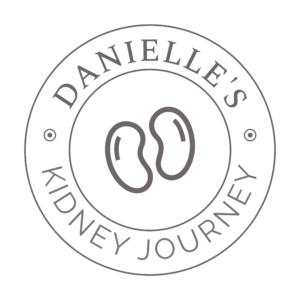Finding My Way Back to Myself
Hi Everyone,
Just when I think my situation can’t get any harder, I’m tested even more.
Before I dive in, thank you for all the emails. So many people have asked what happened with my possible nephrectomy (removal of my transplanted kidney) and my transition to Johns Hopkins for a future transplant.
I met with my transplant surgeon at Inova last Wednesday. Because of the torn calf muscle and my inability to put weight on my foot, they won’t perform any surgeries until I’m at least partially weight-bearing. So for now, everything is on hold.
I can still move forward with meeting Johns Hopkins on August 26 to work on getting listed for a kidney transplant—physical therapy, a stress test, a mammogram—but no surgeries until I can walk with a walker at the very least.
I’ll be honest: I’m disappointed and nervous. My kidney function has been slowly declining. There are many possible reasons—and maybe things will turn around—but I’m scared. Scared that I won’t make it to transplant. Scared that I might have to go back on dialysis. And when I think back to the orthopedic surgeon telling me in the hospital that my leg injury could take three to six months to heal, things get dark in my head.
It didn’t help that just two weeks earlier, I’d been stuck in a hospital bed, staring at four walls. And once I got home—even with visits from friends and family—I was still largely housebound. I tried to stay in good spirits, but the news last Wednesday brought me down.
To cope, I binge-watched Wife Hunters and a bunch of other shows. It gave me a dopamine hit, but when the crash came—along with not sleeping for two nights—depression started to creep in.
The highlights of my day were playing with Barney in the fenced-in play area we set up in the living room, both in the morning and after daycare. But in between those moments, the two days felt long, heavy, and filled with hopelessness and disappointment.
On Friday morning, feeling restless and stuck, I texted my friend Andy, a self-employed attorney, to see if he could pick me up for lunch—and he said yes. I also had a session scheduled with my friend Daniela, who runs a tarot and astrology practice that, for me, often feels as grounding and insightful as therapy. I didn’t know it yet, but both experiences would help pull me out of the mental spiral I’d been in.
Over Zoom, Daniela asked, “What do you want to focus on for this session?”
I said, “I know you don’t work on predicting the future, but the burning question I have is: Will this ever be over?”
She replied, “I don’t know what’s going to happen in the future, but do I have your permission to break your question down a bit?”
Through some gentle probing, we landed on a more grounding question: What do I need to know about dealing with the here and now? With each step, she pulled a tarot card, explained its meaning, offered her interpretation, and asked how it resonated with me.
Two major themes came up: I was grieving the loss of my identity as a leader, a voice, an advocate—and I was also losing hope. As I cried, I told Daniela how each time something medically happened, I thought, This is bad—it can’t get worse. But then it did—and with each setback, I felt myself slipping further away from the person I used to be.
We started talking about how I could begin to reclaim my identity—through writing, advocacy, and being with people, even in small ways. We also talked about how to hold on to hope through prayer, writing, and allowing myself to think beyond the now.
I left the session feeling more like myself again, with the ability to keep going.
In the afternoon, Andy came to pick me up, and we drove to Coastal Flats—one of the few restaurants that can accommodate my dietary needs and has large booths where I can prop up my leg. It’s in Gaithersburg, about a 20-minute drive from where I live and where Andy and I both grew up.
Instead of taking the highway home, Andy and I drove around Gaithersburg, visiting places from our childhood. We took back roads to my house, which used to be country but has become extended suburbs—still beautiful, with large lots that look like fields and gorgeous wooded properties with homes tucked back.
As Andy and I drove and talked, it occurred to me that our car ride felt like an adventure—a glimpse of my adventurous, freer self.
When I got home, I listened to meditation music as I fell asleep instead of watching TV. I melted away into insightful dreams, and when I awoke, I felt calm. That morning, I started writing again.
For me, it has been hard to maintain identity and self in so many circumstances—relationships, career, travel, pseudo-spirituality, and more. I often think about how many times I lost myself and I had to find my way back. But maintaining identity is even harder when faced with sickness, pain, and physical limitations. I never knew I could be tested to this degree.
And in my experience, when identity gets lost, hope gets lost too—the hope that I’ll heal, that I’ll get another transplant that works, and that I’ll be able to participate in life again: to parent, work, travel, and adventure—even if it all looks different from what it did before my kidney injury.
Then I’m blessed with moments of awareness—like those with Daniela and Andy—that gently call to me: “Danielle, oh Danielle, connect with me.” They remind me to get back to basics: find a way to get out of the house, seek an adventure or experience within my limitations, drag myself to the computer to write and remember that my story still has so much to offer—even if it doesn’t have a happy ending right now. I play meditation music to fall asleep, and when I wake up, even though meditating looks different from it did before kidney disease, I know I need that connection—to myself and something higher.
It’s from these moments of connection and reflection that I write to you—not only as a cathartic exercise to process my experiences, but because I want to be witnessed honestly. In my experience, so many of us carry deep, human experiences that are rarely processed out loud. Maybe my voice gives you permission to reflect on yours.
And when we reflect, we come back to ourselves. And from that place, we can hope again because we remember who we are and what we’re capable of.
With love,
Danielle
Interested in becoming a living kidney donor? Learn more through DOVE, a nonprofit supporting veterans in need.



